April 27, 2009
Travel: The Poetry of Motion
As I type this it is Monday: with any luck this will be posted before Tuesday though if I don’t manage to get it up in time let me extend my apologies for the delay and my thanks for your patience!
This month’s virtual exhibit, Travel: The Poetry of Motion, has been a good deal of fun to put together because though the subject is quite general, some interesting themes emerged as the literature presented itself. The history of travel literature is distinctly Western and often colonial, and the present is apologetic, reflective and surprisingly inward-looking – what will be the future, I wonder? When we’ve mapped all the places and normalized or done away with the concept of “foreign-ness”, what will remain? What will travelers of the future write home about?
The Grand Tour
In the eighteenth and nineteenth centuries it became fashionable for young (European) people to do a tour of Europe, visiting all the great cultural sites as a a sort of rite of passage. This was part of the prestige of being a member of the educated class; you were expected to have seen and visited specific sites, works of art, events, shows. Naturally, those of a literary inclination wrote home about their experiences.
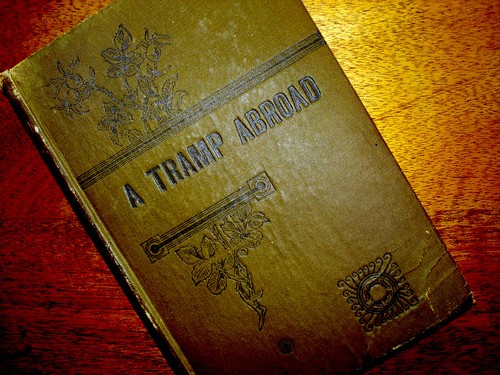
A Tramp Abroad by Mark Twain, Rose Publishing, Toronto
Submitted by Susan, from her grandmother’s collection.
Originally published in 1880, this chronicles Twain’s travels in Germany, Switzerland & Italy. This is an early edition, says Susan: “…given to Dora [my grandmother] by older brother Fred (the black sheep) when she was 15. I love this one too because of its Canadian roots – Rose Publishing of Toronto.”
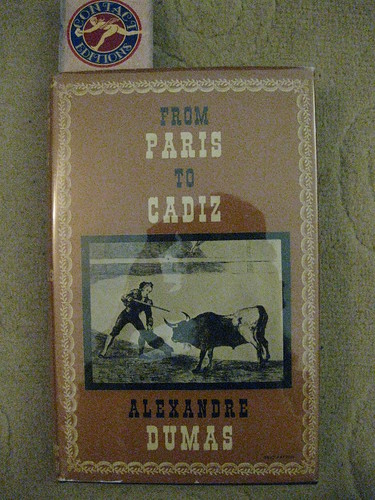
From Paris to Cadiz by Alexandre Dumas, Peter Owen Ltd., London, 1958
Found at Contact Edition in Toronto, Ontario – though now it lives in my library.
This is the first English translation of Alexandre Dumas’ voyages to Spain, considered the “high water mark” of his “Impressions de Voyages”. Dumas’ travel books are colourful, exciting and almost entirely non-fiction.
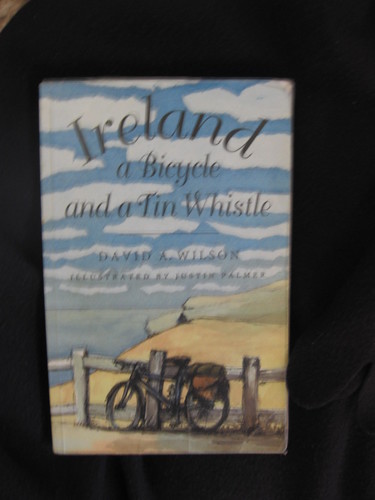
Ireland, a Bicycle, and a Tin Whistle by David Wilson, McGill-Queens University Press, 1995
Submitted by Imshan, who has it at home.
David Wilson is a professor at the University of Toronto who writes of his experiences in Ireland here.
Colonial Wanderings
Outside of continental Europe, travel was not a comfortable cultural exercise but seen as a sort of rugged adventuring. At the same time that young gentlemen were hobnobbing around Europe, those of a more curious inclination were sailing off to all corners of the world to “discover” the exotic locals. All places outside continental Europe were exciting scenes of adventures amongst savage natives and wild beasts as far as Western readers were concerned, and colonial travel literature was an enormously popular product. Unsurprisingly, the “travel literature” section of most bookstores is still made up of these sorts of narratives.
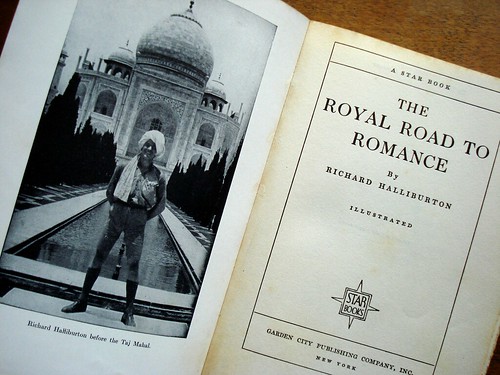
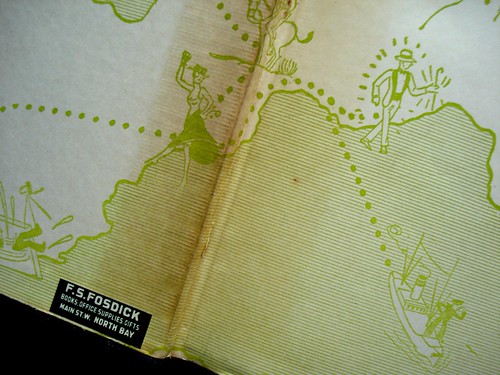
The Royal Road to Romance by Richard Halliburton, Garden City Publishing Company, 1925
Also submitted by Susan, from her grandmother’s collection.
Halliburton was “…an American traveler, adventurer, and author” (and publicity-seeker) born in 1900 and “presumed dead” in 1939. Royal Road covers his travels in the Middle East as well as the Far East. Susan says “Note the ‘colonial’ pose of Halliburton on the title page.” – pretty classic!
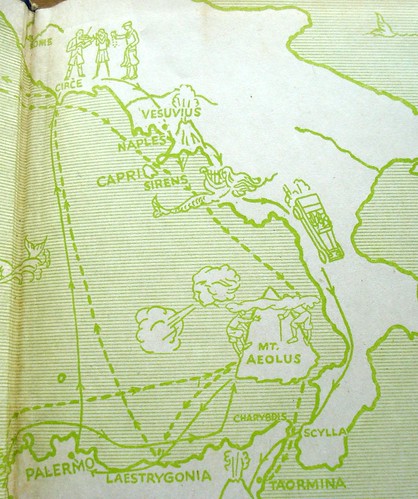
The Glorious Adventure by Richard Halliburton, Garden City Publishing, 1927
Also submitted by Susan, who “Emboldened by my stunning win in your last collecting contest, I rummaged
through my grandmother’s books for more material.”
Halliburton this time followed the path of Ulysses around the Mediterranean. Susan adds, “reading those books firmed my resolve to travel Europe on a bicycle and trace the path of Odysseus.
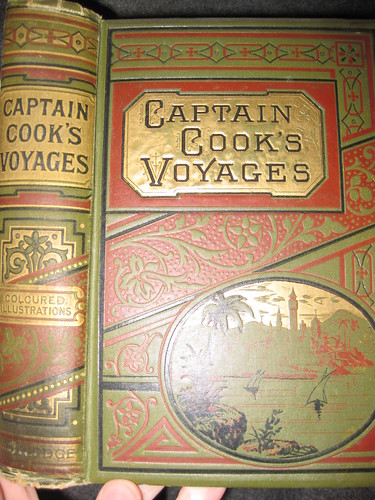
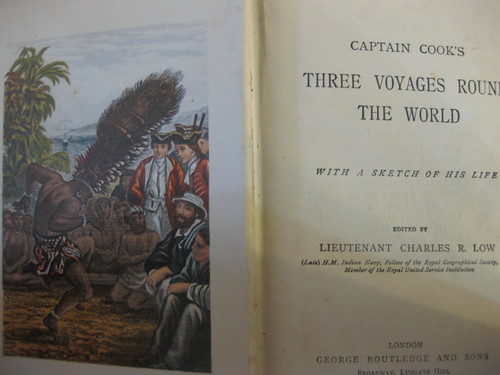
Captain Cook’s Three Voyages Round the World ed. Lt. Charles Low, George Routledge & Son, London,
Found by me at my cottage (Gravenhurt, Ont.)
What really struck me about this book was the illustration at the beginning of our refined English voyageurs being entertained by colourful natives!

Wanderings in South America by Charles Waterton, Nelson, London, Edinburgh & New York, 1891
I honestly can’t remember where I found this one, but now it lives in my dining room.
According to his reviewer, Waterton “preferred living with Indians and monkeys in the forests of Guiana” to his native Yorkshire and his writings transport the reader from the “cultivation of the civilized parts of the earth” to the “freedom of the savage and the wild beauties of nature.” Who can argue with that?
Imagining Places
Perhaps the future of travel literature is in the idea of place and the meaning the individual brings to it. Travel for reasons other than “tourism”, to tour sites of cultural value determined by a societal standard. The notion that travel needs to involve an actual visit is up for a challenge as well – is place a notion that is determined by a physical reality or by our ideas of it?


The Penguin Encyclopedia of Places by W.G. Moore, Penguin Books, England 1971
Submitted by Kerry, who found it ” at the 2007 Victoria College Book Sale, but now it lives in my living room.”
Kerry says: “Because it’s also a dictionary of imaginary places, or at least places that have to be imagined now that it’s no longer 1971. Also, sometimes a perfect encapsulation of the world circa 1971 is very useful to have on hand. And finally, because the cover also makes it appear that 1971 was groovy the world over.
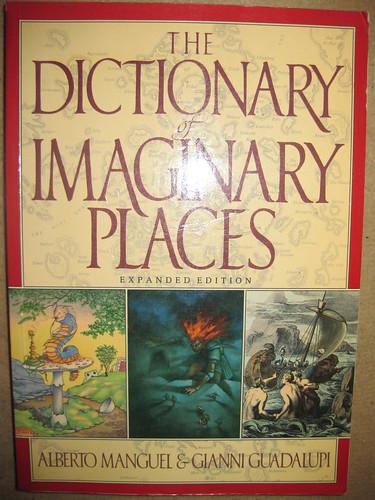
The Dictionary of Imaginary Places, Expanded Edition, by Alberto Manguel and Gianni Guadalupi, Lester & Orpen Dennys, Toronto, 1987
I found this book at the Manotick Public Library when I was a kid, and later bought my own Now in my dining room.
It’s the perfect atlas to all the places that never existed. The Dictionary includes extensive maps of fictional worlds as diverse as Tolkien’s Middle Earth and the Swiss Family Robinson’s New Switzerland. Plan your flights of imagination with this meticulous resource.
***
Thank you to Susan, Kerry & Imshan for your submissions! The prize this month (a book bag and bookmark from the Osborne Collection of Early Children’s Books) goes to Kerry for her unique and unexpected take on the subject! I’ll be in touch for your mailing address, Kerry!
One thought on “Travel: The Poetry of Motion”